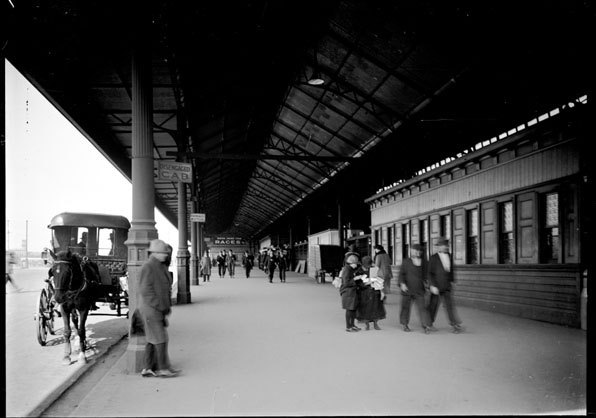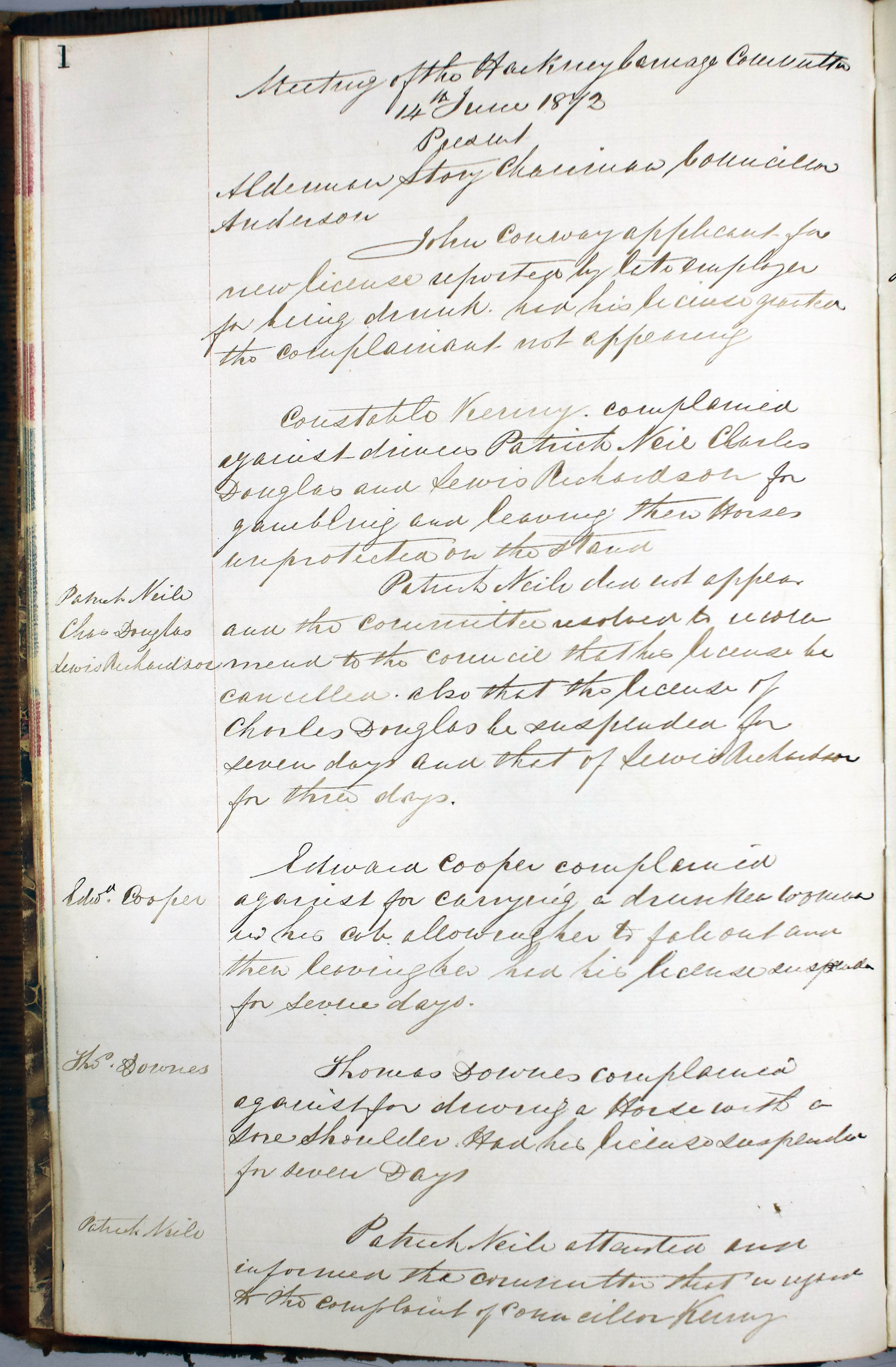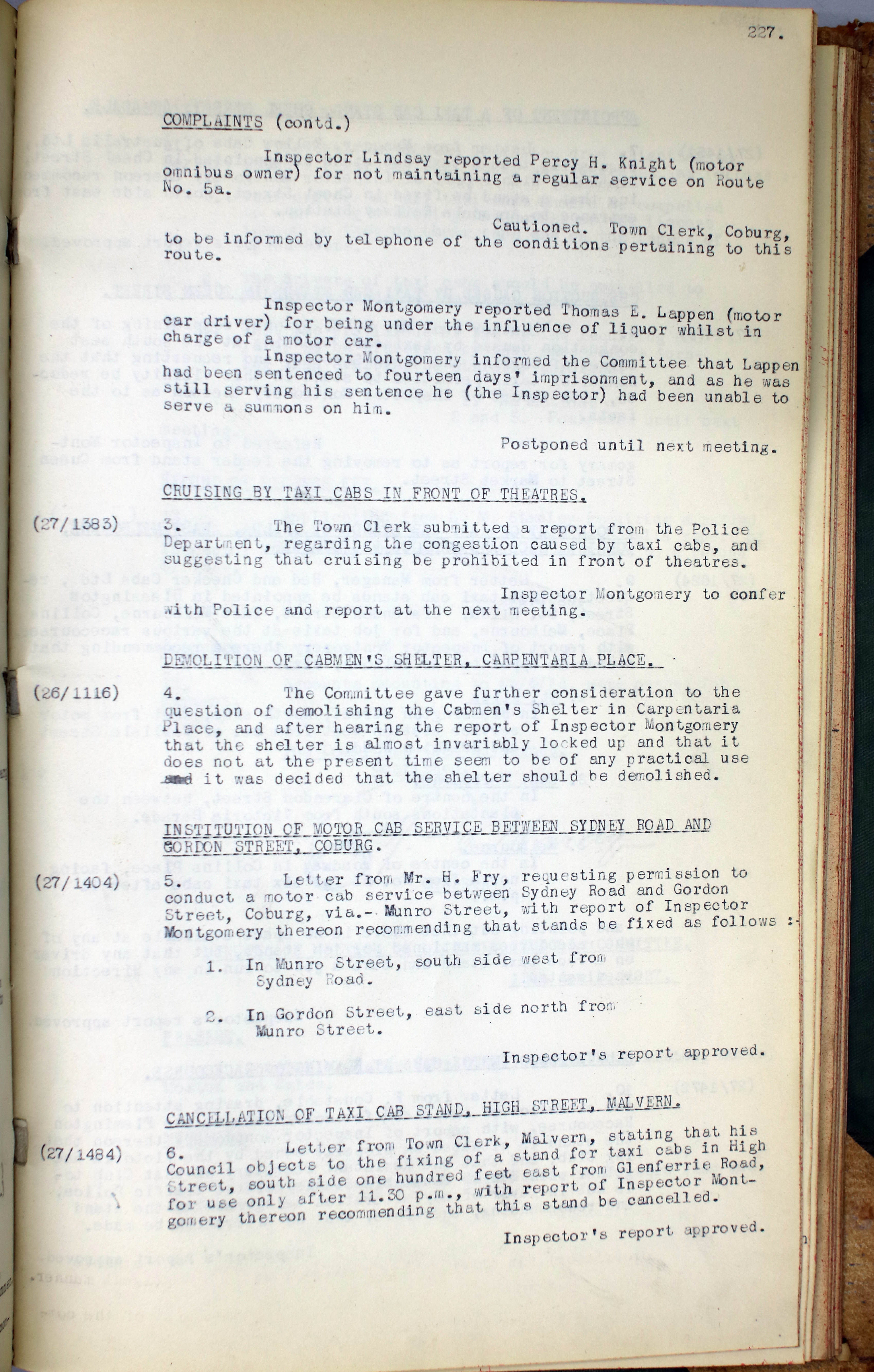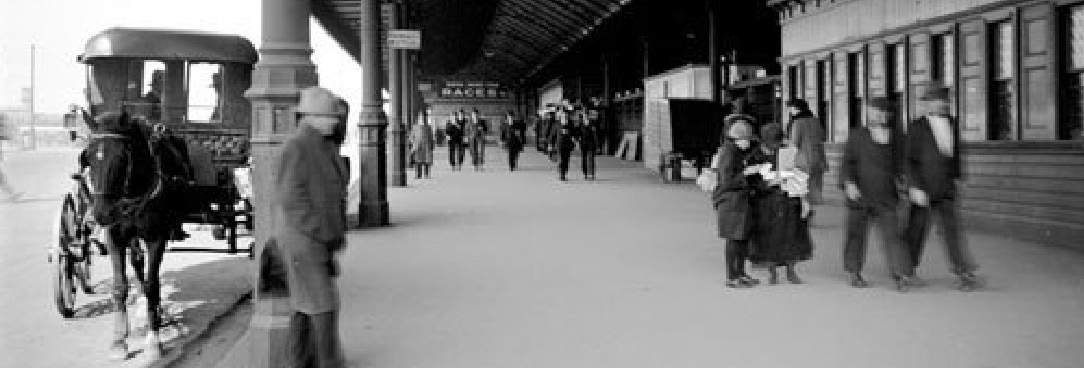Author: Graham Herschell

Origins of "Uber"
In 1883, Nietzsche coined the term "Übermensch" to describe the higher state to which he felt men might aspire. From this first iteration of the term, the Uber ride sharing service, which has become very popular in Melbourne, has grown [1].
Whether or not the Uber ride service has lived up to this lofty ideal is a matter of opinion, and has led to a lot of discussion about the existing taxi services, the conditions of the cars, as well as the friendliness, knowledge and ability of the drivers. This is nothing new!
I don’t know whether the cab drivers of the late Victorian era were in the habit of reading Nietzsche or whether they aspired to any higher state, however the industry was controlled by a board whose judgements and rules were in some ways harsher and in other ways more lenient than today.
I’m sure that, in the main, the public were conveyed by “Uber” sober, law abiding citizens; however, a perusal of the records in the series entitled: Hackney Carriages (Licensed Vehicles) demonstrates that not all of the drivers were without flaws.
Hackney Carriages of Melbourne 1859 – 1938
The series consists of 15 Volumes stretching from 1859 – 1938 and documents the activities of a committee overseeing the operation of the taxi industry at that time.
The committee’s major task appears to have been monitoring the various types of license applications (i.e. Hackney Carriages, Motor Car Drivers, Motor Car Owners, Carters and Motor Omnibus) and dealing with any petitions, complaints or correspondence referred to it.
For instance, this excerpt from Page 143 of Volume 2:
“Petition received from Palmer and O….. praying that the Cabmen on the Richmond road may be permitted to charge 6 pence in lieu of 3 pence for the journey from Melbourne to Richmond and from Richmond to Melbourne after 11pm. Prayers of the petition granted to commence after the 12th January 1876 and cabmen instructed to have the number of passengers which their vehicles are licensed to carry painted inside their cabs.”
However, amongst the formalities, is a bit of larrikinism, often in the form of drunkenness. In June 1873 Edward Cooper fronted the committee. I imagine the hearing might have gone a little something like this...
Meeting of the Committee (Dramatisation)

14th June 1873
Present: Alderman Story (Chairman), Councillor Anderson, Cab driver Edward Cooper, Constable.
(Names have not been changed to protect the innocent as they are all dead anyway either that or they are over 150 years old and don’t care anymore. )
Alderman Story: And why are you fronting the committee?
Edward Cooper: Well, your honour…
Alderman Story: Alderman Story will do.
Edward Cooper: Yes Alderman Story.
Alderman Story: Well?
Edward Cooper: Well what?
Alderman Story: Why, are you here Sir?
Edward Cooper: Cooper will do.
Alderman Story: I beg your pardon?
Edward Cooper: Sorry sir, a bit nervous.
Alderman Story: Indeed… Constable why is he here?
Constable: He’s here Alderman Story because I brought him here.
Alderman Story: And why did you bring him here?
Constable: Oh, yes… well let me see it’s in my notes here somewhere, ah here it is. He stole a pair of boots….no, that’s not it…he.. er, that’s right ah.. He allowed a woman… it was Pratt sir who stole the boots sir… he, Cooper that is, allowed a woman to fall from his cab sir.
Alderman Story: I see, so did the woman fall from his cab or did he push her?
Constable: Oh no sir, she definitely fell from his cab.
Alderman Story: Was he driving…were you driving unduly roughly Cooper?
Edward Cooper: No more unduly than usual Alderman Story.
Alderman Story: Do people often fall out of your cab?
Edward Cooper: Oh no sir, not unless they’re p****d.
Alderman Story: Then there will be no foul language in this committee room!
Edward Cooper: Yes sir.
Alderman Story: So this woman was…. inebriated?
Edward Cooper: As a parrot sir.
Alderman Story: Quite… So Constable, what is the charge.
Constable: The charge sir is that he allowed the drunken woman to fall from his cab and he left her there and drove off without offering any assistance.
Alderman Story: Is this true Cooper?
Edward Cooper: To the extent that it isn’t a lie sir, yes.
Alderman Story: And what excuse can you offer up?
Edward Cooper: I had another fare arranged sir and I didn’t have time.
Alderman Story: What fare?
Edward Cooper: I had to pick up Pratt sir; he was getting some new boots.
Alderman Story: Licence suspended for seven days. Next!
The above of course is pure speculation but the basic facts are recorded in the pages of VPRS 4035 P0 Volume 2. Edward Cooper had his licence suspended for seven days for allowing a drunken woman to fall out of his cab and for leaving her where she fell.

Complaints vprs 4035/P0/Unit14
Complaints and Other Grievances
Also in the files, George Harris had just left prison after serving a sentence for stealing boots – presumably so he could drive his cab – and then promptly had his licence cancelled. Walter Pratt was refused a licence because he too had been convicted of stealing a pair of boots.
Then there’s the case of Patrick Neil, Charles Douglas and Lewis Nicholson gambling and leaving their horses unprotected on the street.
There are also a number of drink driving offences; earning the perpetrators, Robert Cane and Humphrey Sugden amongst others, a warning with the threat of suspension should they reoffend.
Although I am highlighting the bad, which is always more interesting, you can see by some of the later volumes in the series that the committee is trying its best to improve the situation for both drivers and the public.
The Cabman's Shelter
Unit 14 of the series covers the 1920s and is typewritten. In it, there seems to be less concern about drunkenness - although on p.226 an Inspector Montgomery reported Thomas E Lappen for being under the influence of liquor whilst in charge of a motor car. Unfortunately Mr Lappen was in gaol at the time so the Inspector was unable to serve a summons on him. There was more concern about such things as locality tests for the drivers, a debate still being had today, and improving a number of taxi stands in the city.
An interesting entry in this volume talks about the demolition of a cabman’s shelter in Carpentaria Place Melbourne. Carpentaria Place was originally part of the Parliament House grounds but became detached in 1863. It was demolished during the construction of the City Loop and the area is now known as The Gordon Reserve.
Again, Inspector Montgomery reports that “…the shelter is almost invariably locked up and that it does not at the present time seem to be of any practical use..”
It would seem that the shelter wasn’t demolished after all, according to a report in The Age Newspaper , on June 11, 2005 it was moved to Yarra Park [2].
The above is just a small amount of information that can be gleaned from the Hackney Carriages series. This series provides a valuable insight into some of the history and management of public transport through the years. I think it’s fair to say that many of the issues that were being tackled are still around today and, thanks to the Uber phenomenon, are being discussed in a new light.
[1] https://en.wikipedia.org/wiki/%C3%9Cber
[2] http://www.theage.com.au/news/Sport/Landmarks/2005/06/10/1118347594978.html
Material in the Public Record Office Victoria archival collection contains words and descriptions that reflect attitudes and government policies at different times which may be insensitive and upsetting
Aboriginal and Torres Strait Islander Peoples should be aware the collection and website may contain images, voices and names of deceased persons.
PROV provides advice to researchers wishing to access, publish or re-use records about Aboriginal Peoples
